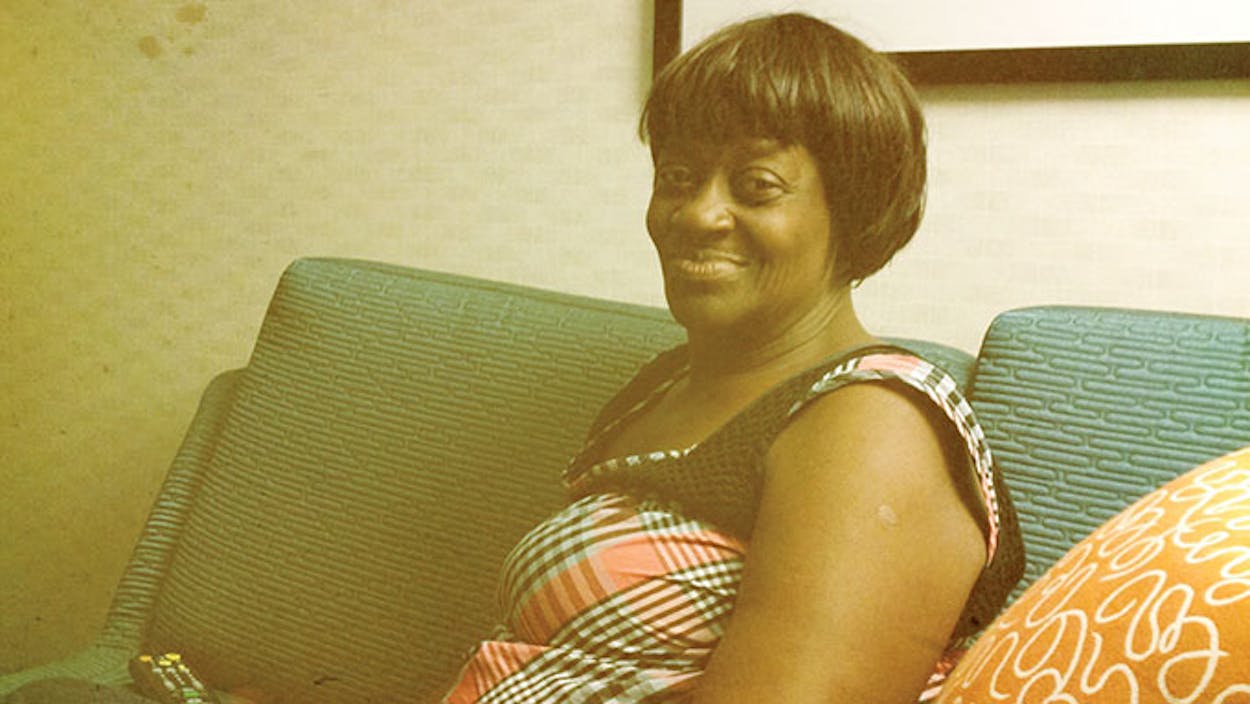Fifty-five-year-old Rosie Sanders has lived on the streets for around forty years, except for brief periods, like when she shared a bedbug-infested Dallas apartment with her long-lost invalid son. Even then she considered herself homeless, since for Sanders, homelessness is as much a state of mind as a matter of whether there’s a roof over her head. Wherever she is staying, she knows that she has no home.
Still, she enjoys a night in a hotel as much as the next person. This past May, she checked in to one of the grandest rooms at the Marriott’s SpringHill Suites off Northwest Highway in Dallas. She unlaced her purple-and-gray sneakers, placed them neatly by the door, and cranked up the AC. Then she brewed a pot of Royal Cup coffee, sank into the couch, and opened a bag of chili-cheese Fritos. She looked forward to making the most of her unobstructed view of the TV—a luxury rarely afforded her at the shelters where she often sleeps.
Sanders had won her hotel stay in a raffle the day before at the Concert for the Homeless, which Morton H. Meyerson, the businessman after whom Dallas’ symphony center is named, started in 2003. That first year, a quartet of Juilliard students performed a three-movement concerto for roughly three hundred homeless people, who gave the musicians a standing ovation.
Sanders heard about the Concert for the Homeless for the first time this spring in the cafeteria at her main shelter, the Bridge. She almost didn’t go, since she thought the performers would be fellow homeless people belting out tunes in an ad hoc choir, something she wasn’t all that eager to sit through. In fact, the musicians at the semiannual event are accomplished performers, like Haley Hoops, the Dallas Symphony Orchestra’s second-chair horn player, who appeared this year and, after explaining the role a French horn plays in hunting, knocked Gioacchino Rossini’s “Le rendez-vous de chasse” out of the park.
Ultimately Sanders went to the concert, at the First Presbyterian Church, because she knew she’d get a backpack filled with toiletries, a sewing kit, and a water bottle, plus a chance to win a night at the Marriott. She ended up coming away with something more. When Floramay Holliday, a pretty blond acoustic guitarist wearing a cowboy shirt and jeans, took the stage and belted out “Jesus Is the King,” the audience rose to its feet and enthusiastically clapped along to the climactic line: “ ’Cause I found salvation.” Afterward, Sanders described being filled with “faith and trust in the Lord.”
Following the concert, she received a plain black backpack with a red ticket, number 208591, attached. While crossing the street to the Stewpot, the homeless resource center where the raffle drawing would take place, she found two additional red tickets.
Resting against a mound of hotel couch pillows and a blanket, Sanders recounted the afternoon’s events in her Southern drawl. “I said, ‘Well, if mine don’t hit with that 91, the other two will.’ And 91 hit—my original ticket. I was like, ‘Wow, me?’ ” she said, craning her neck. “ ‘I won?’ ”
Sanders broke into a full-on grin, despite the fact that she doesn’t like to smile with her teeth showing. “My thing was a drug problem,” she explained. “I did that to myself. Why the”—her voice rose to a higher pitch—“hell did I have to end up still going and going and going?”
Massaging her hands, she blamed her innate curiosity. As a teenager, she wondered what people were doing out on the streets at two or three o’clock in the morning. “I slipped out there one night and never came back,” she said.
The phone rang. Sanders looked at it and said, “Man, what you want, young lady?” Then she picked up the receiver. “Yes, ma’am,” Sanders said, turning sweet. The woman who checked her in needed to verify her gift card. “She didn’t swipe it?” Sanders said, incredulously, once off the phone.
Before going down to the lobby, Sanders dug through her purse, a black leather hobo with metallic studs, for pictures of her five grandchildren in Oklahoma. The oldest, the only one who knows her, looked to be around seven; one of the younger boys posed on a toy Longhorn. She keeps the pictures in her purse at all times, never her suitcase, which she worries is more susceptible to theft at some of the shelters. She says it’s her goal to see all of her grandchildren and to make sure they’re taken care of before she leaves this earth.
That night, though, her goals were more easily attainable: a bubble bath and Oz the Great and Powerful on pay-per-view. Then she would enjoy the peace and quiet and the odorless hotel air. After all, there’s no place like home, even if it’s just pretend.







